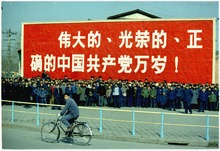
Back الدعاية في الصين Arabic Propaganda in der Volksrepublik China German پروپاگاندا در چین Persian Propagande de la république populaire de Chine French 중국의 선전 Korean Propaganda w Chińskiej Republice Ludowej Polish تبلیغات په چین کې Pashto/Pushto Propaganda na Kitajskem Slovenian Propaganda në Kinë Albanian Çin'de propaganda Turkish
| Propaganda in China | |||||||
|---|---|---|---|---|---|---|---|
 A large sign featuring a propaganda slogan in 1972: "Long Live the Great, Glorious, and Correct Communist Party of China!" | |||||||
| Simplified Chinese | 中华人民共和国宣传活动 | ||||||
| Traditional Chinese | 中華人民共和國宣傳活動 | ||||||
| |||||||
Propaganda in China is used by the ruling Chinese Communist Party (CCP), and historically by the Kuomintang (KMT), to sway domestic and international opinion in favor of its policies.[1][2] Domestically, this includes censorship of proscribed views and an active promotion of views that favor the government. Propaganda is considered central to the operation of the CCP and the Chinese government,[3] with propaganda operations in the country being directed by the CCP's Central Propaganda Department.
Aspects of propaganda can be traced back to the earliest periods of Chinese history, but propaganda has been most effective in the twentieth and twenty-first centuries owing to mass media and an authoritarian government.[3] The earliest Chinese propaganda tool also was an important tool in legitimizing the Kuomintang controlled Republic of China government that retreated from mainland China to Taiwan in 1949.
Propaganda during the Mao era was known for its constant use of mass campaigns to legitimize the party and the policies of leaders. It was the first time the CCP successfully made use of modern mass propaganda techniques, adapting them to the needs of a country which had a largely rural and illiterate population.[3] Today, propaganda in China is usually depicted through cultivation of the economy and Chinese nationalism.[4][needs update]
- ^ Brady, Anne-Marie (2006). "Guiding Hand: The Role of the CCP Central Propaganda Department in the Current Era". Westminster Papers in Communication and Culture. 1 (3): 58–77. doi:10.16997/wpcc.15.
- ^ Cite error: The named reference
Shambaughwas invoked but never defined (see the help page). - ^ a b c Mitter, Rana (2003). Nicholas J. Cull; David Colbert; David Welch (eds.). Entry on "China" in Propaganda and Mass Persuasion: A Historical Encyclopedia, 1500 to the Present. ABC-ClIO. pp. 73–77. ISBN 9781576078204. OCLC 51779499.
- ^ Link, Perry; Kurlantzick, Joshua (25 May 2009). "China's Modern Authoritarianism". The Wall Street Journal. ISSN 0099-9660. Archived from the original on 16 July 2017. Retrieved 14 June 2020.
© MMXXIII Rich X Search. We shall prevail. All rights reserved. Rich X Search